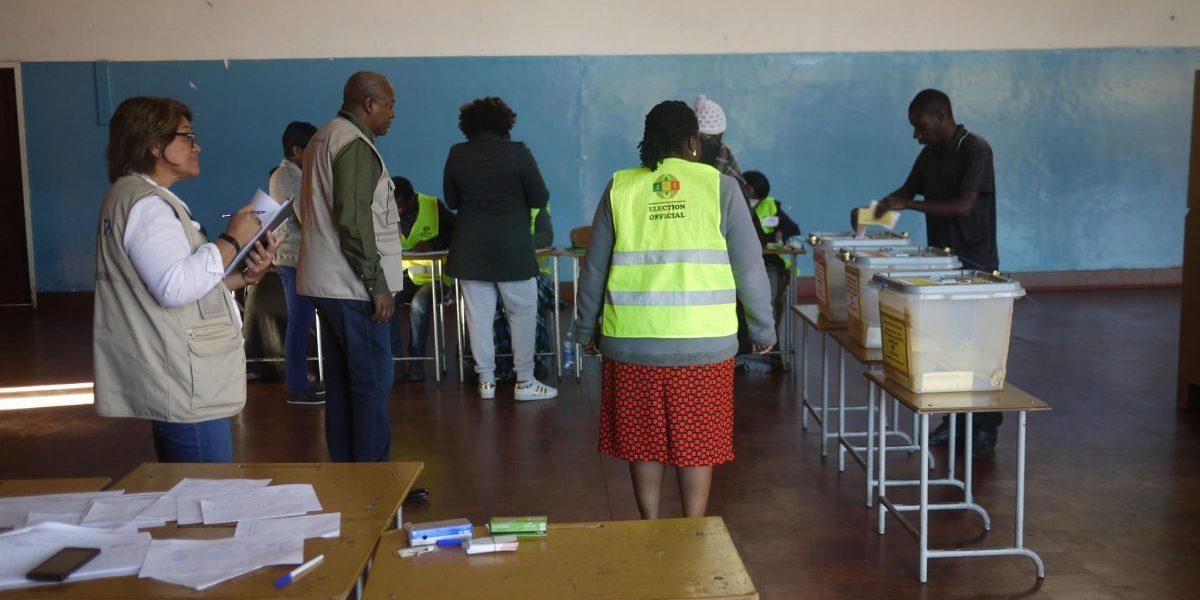FIVE years ago this month, a fledgling coalition of trade unionists, human rights activists, women’s groups, constitutional reformists, farm labourers and business tapped a deep vein of popular discontent and handed a stunned Robert Mugabe his first defeat at the ballot box – rejection of the president’s draft new constitution for Zimbabwe in a nationwide referendum. A few months later, in June 2000, the coalition struck again, winning nearly half of all elected seats in the parliamentary elections.
In less than a year, the Movement for Democratic Change (MDC) had established itself as a formidable political threat to Mugabe and the most significant opposition party in Africa.
But less than two months before parliamentary elections scheduled for 31 March, the MDC was struggling for relevance. Bridled by biased election laws, ballot fraud, political violence, media bans and treason charges against its leader, Morgan Tsvangirai, the party faced a lose-lose scenario going into another poll that outside observers say the state has already fixed: Participate and legitimise a farce or boycott and lose all influence in parliament?
In early February, the MDC announced it would enter the poll, but as Tsvangirai said a few days earlier: ‘We’re damned if we do and damned if we don’t.’
Africa remains a hostile place for opposition politics. In more than a dozen parliamentary or presidential elections held in 2004, not one party was tossed out. The trend looks likely to hold this year. Although Africa has gone from three to more than 40 at-least nominal democracies in the past 15 years, power hasn’t budged.
Is plurality a fading fad in Africa? ‘Opposition parties in Africa are an endangered species,’ argues Rok Ajulu, a Kenyan political analyst at Rhodes University in South Africa.
African leaders have adopted a number of overlapping covenants spelling out the terms and conditions of fair elections, from the Constitutive Act of the African Union to the charter on election standards signed by the heads of state of the Southern African Development Community last August. These agreements call for freedom of assembly, freedom of the press, judicial independence, access to local and foreign observer missions, independent electoral commissions, and so on.
But committing ink to paper does not guarantee fair play at the ballot box. Ruling parties remain the primary threat to fair elections. As the eminent South African jurist George Bizos argues: ‘For elections to have legitimacy, you need to have respect for your opponent.’
Ben Ulenga, leader of Namibia’s Congress of Democrats, was once a long-time loyal member of Namibia’s ruling party and erstwhile liberation movement. SWAPO, he says, ‘quickly narrowed political space immediately after independence.’
Malawi opposition leader John Tembo says his ‘Malawi Congress Party does not mind losing in a free and fair election… However [we] worry about the interference with the process of democracy by the ruling political party.’ After the country’s presidential elections last year, observer missions criticised the ruling United Democratic Front for a range of violations, including lack of equal access to the media and suspected manipulation of the registration and vote-collation processesing.
Others argue that an imbalance of powers among the branches of government also adversely affects multiparty democracy in Africa. ‘The region is characterised by dominant party syndrome,’ says Patricia de Lille, who leads the nascent Independent Democrats in South Africa, ‘typified by dominant executives and weak parliaments…. There is no real culture of dialogue and debate in our countries.’
But African opposition parties are too often their own worst enemies. Numbers alone tell a story. Squabbling parties constantly split, splinter and merge. In South Africa’s national election last year, 20 parties sought to unseat the African National Congress. None received more than 13% of the vote, while the ANC received almost 70%. The Democratic Republic of Congo, which is due to hold its first ever elections later this year, currently has more than 240 parties.
The popular clamour for political change that brought Mwai Kibaki and the National Rainbow Coalition to power in Kenya in 2002 has tangible resonance across Africa. For it to be expressed at the ballot box requires fair play by ruling parties. But it also requires political maturity among the opposition.
‘Zimbabwe faces a crisis of leadership across the board,’ says Trevor Ncube, CEO of the Mail & Guardian. ‘There is acute leadership paucity in the MDC. They’ve shown a lack of strategy, a lack of vision and tremendous political naiveté. They aren’t streetwise. But in spite of that, those who want change will vote for them.’








